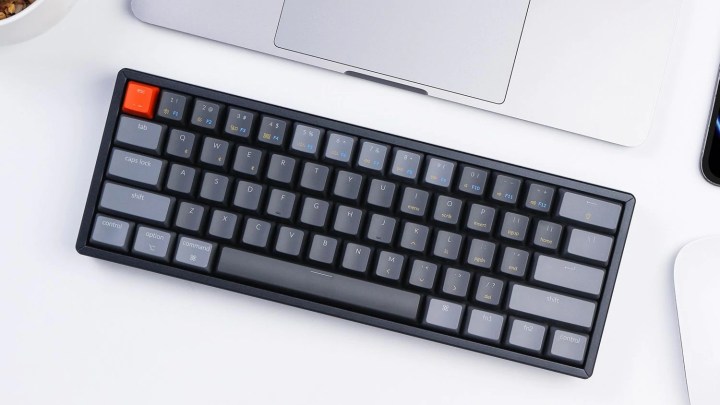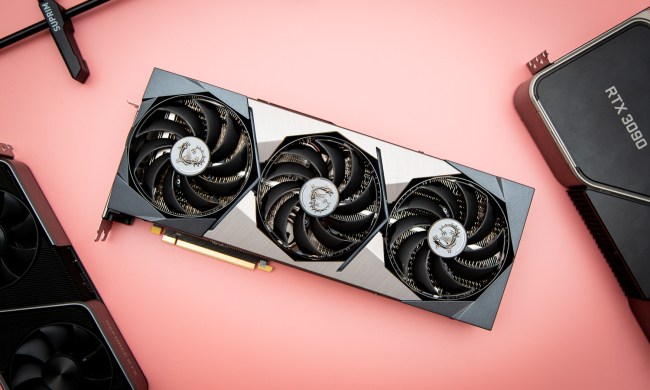
Investing in the best mechanical keyboard can bring a huge improvement to the way you type or game on your PC. Available in all sorts of shapes and sizes, these keyboards usually cost a fortune. But there are quite a few options that are suited for someone who wants to buy their first mechanical keyboard or maybe someone who doesn't want to spend a lot of money.
Now whether you are looking for a new gaming keyboard or just something that offers great tactile feedback while typing, there is one for everyone! Our top pick has to be the EVGA Z15 which is a full-size keyboard offering a bunch of features including the ability to swap key switches. Similarly, if you are looking for something that is compact, do have a look at the Keychron K12.







Best full-size mechanical keyboard on a budget
EVGA Z15
- Low-click latency
- Custom RGB lighting
- Hot-swappable switches
- Macro-programmable keys
- ABS keycaps
- Questionable logo size
- No USB passthrough
Why should you buy this: It is the most feature-packed budget mechanical keyboard.
Who’s it for: Serious gamers and for those who want a mechanical keyboard that is packed to the brim.
Why we picked the EVGA Z15:
EVGA is better known for making graphics cards, but the company also sells peripherals including keyboards and mice. The Z15 is a great keyboard and our pick for the best mechanical keyboard on a budget as it comes with a wide range of features. Now it isn't the cheapest one compared to other products on this list, but it has a solid metal top-plate, hot-swappable key switches, customizable per-key RGB lighting, a volume wheel, and the ability to set macros to almost any key. The keyboard also comes with one of the fastest polling rates of 4000Hz, while the Kailh Speed switches have a low actuation point making your keystrokes even faster. The keyboard also comes with dedicated RGB software, a bundled wrist-rest, multimedia keys, and a warranty of three years which is more than most keyboards on the market.
For about $75, this is the best mechanical keyboard on the market, but there are a few gripes that we have. The Z15 features ABS keycaps which are not the best as they become shiny after prolonged use, while the keycap font is also something that might not appeal to all. Another point of concern is that huge belt-buckle style EVGA logo sitting on top, it just looks out of place. Apart from that, the keyboard is pretty solid and should last you for a long time.


The best tenkeyless mechanical keyboard on a budget
HyperX Alloy Origins Core
- Aluminum body
- Per-key RGB lighting
- Removable USB-C Cable
- Programmable macros
- Ngenuity software needs more work
- ABS keycaps
- No wrist rest
Why should you buy this: It is one of the best budget mechanical keyboards with a tenkeyless layout.
Who’s it for: Gamers looking for a tenkeyless mechanical keyboard on a budget.
Why we picked the HyperX Alloy Origins Core:
The HyperX Alloy Origins Core is a great mechanical keyboard that doesn't cost a bomb, yet feels quite premium. It features a tenkeyless layout which means it doesn't include a number pad, thus accommodating less space on your desk. It features a solid aircraft-grade aluminum body while the feet at the bottom offer three different levels of adjustment for the perfect angle while typing. HyperX gives you the option to choose between linear, tactile, or clicky switches, and while they aren't Cherry MX, they feel pretty good to use. It also comes with per-key RGB lighting, onboard profile storage, macro support, and a detachable USB-C cable.
The lack of a wrist rest, and dedicated media buttons, are a letdown, and we really wish that the company didn't use ABS keycaps as they get shiny and slippery with all your finger oils. Other than that, the HyperX Alloy Origins Core is well worth the asking price of $70.


A versatile 60% mechanical keyboard on a budget
Keychron K12
- Great build quality
- Hot-swappable key switches
- Multi-device connectivity
- Support for both Windows and macOS
- Additional cost for RGB model
- Keys cannot be programmed
- No dedicated software
Why should you buy this: It is one of the best 60% mechanical keyboards with wireless connectivity.
Who’s it for: For the ones looking for a compact, multi-purpose mechanical keyboard on a budget.
Why we picked the Keychron K12
Keychron started off as a Kickstarter project and today offers an impressive range of keyboards offering a wide variety of layouts ranging from 60% to 100%. They make some of the best value for money keyboards and one such product is the Kerychron K12, a 60% keyboard with a lot of potential. First of all, it is wireless and can be paired with up to three devices at once via Bluetooth. There are a variety of customization options including a solid aluminum frame with RGB backlighting instead of the standard white backlight, and the option of getting the keyboard with hot-swap key switches. By default, you can get the keyboard with Gateron G Pro mechanical or Keychron's optical switches. The keyboard supports both Windows and MacOS and even comes with additional keycaps corresponding to the operating system that you intend to use. The USB-C port can be used for wired operation or charge the 4000mAh battery that should last for around 2 months (8hrs of daily usage) with the backlight off.


Best wireless mechanical keyboard for gaming and productivity
Keychron V5 Max
- Wireless over 2.4GHz and Bluetooth
- Understated design
- Great battery life
- Switches can be swapped out
- Available in switch-free barebones kit
- More expensive than most budget mechanical boards
Why should you buy this: It is the best wireless mechanical keyboard available at an affordable price point.
Who’s it for: Gamers looking for the best-performing wireless keyboard with mechanical switches.
Why we picked the Keychron V5 Max:
The Keychron V5 Max is a very capable wireless keyboard for gaming, typing, or programming — or a little of all three. Its Gateron switches are responsive and springy, though they can be swapped out for your preferred option, and this keyboard is available in a barebones kit without any switches, should you want to DIY build this keyboard from the ground up.
Its keys are all gasket mounted with sound dampening foam, so whatever switches you opt for the end result will be a quiet and comfortable typing experience. This keyboard works fantastically well with its 2.4Ghz wireless dongle or over Bluetooth, so it can connect to a range of devices and multiple devices at the same time. The double-shot PBT keycaps are durable and will resist wear over time, and this keyboard supports QMK and VIA remapping on any operating system for any key, so you have complete control over its function.
It even has a fast 1,000Hz polling rate for gaming (limited to 90Hz in Bluetooth mode), making this a fast and responsive keyboard for competitive play, too.


Best ultra-budget mechanical keyboard
Redragon K552
- Inexpensive
- Rugged build quality
- Decent RGB lighting
- Keycaps are not the best
Why should you buy this: It is the best entry-level mechanical keyboard.
Who’s it for: For those who want to get their first mechanical keyboard at an ultra-low budget.
Why we picked the Redragon K552
Available for as low as $35, the Redragon K552 is perfect for someone who wants to buy their first mechanical keyboard on a tight budget. It features a tenkeyless design having a total of 87-keys and is available with blue, red, or brown key switches. The build quality is surprisingly good and robust for a keyboard at this price and you get RGB backlighting with 19 different modes and six brightness levels. The adjustable feet at the bottom are flimsy, but get the job done.
The Otemu key switches aren't the most premium when compared to Cherry MX, but one can't really complain at this price. Coming down to the keycaps, they are probably the weakest part of the keyboard, made of ABS plastic with pad-printed legends. Expect these to quickly develop a shine on top due to finger oils while the legends shouldn't last long.
Still, for $35, even if this keyboard only lasted you a few years, you'd easily get your money's worth.


Best cheap mechanical keyboard
Keychron C3 Pro
- Fast and responsive mechanical switches
- Has basic backlighting
- Super-affordable price
- Supports Windows, macOS, and Linux
- No swappable switches
- Limited to single-color backlighting
Why should you buy this: It's the best super-cheap mechanical board we could find.
Who’s it for: Anyone who wants a good mechanical keyboard on a tight budget.
Why we picked the Keychron C3 Pro:
The Keychron C3 shouldn't be as affordable as it is. It's barely over $35 and yet it's a fully mechanical keyboard with comfortable and responsive switches, colorful backlighting, a compact design, and gasket mounting for quiet typing and gaming. It's a wired keyboard, but has wire runners on its underside so you can tuck most of it away. It even has a 1,000Hz polling rate making it responsive for gaming.
The built-in memory lets you store your key configurations, with QMK/VIA remapping so you can change the keys to anything you want on any platform you want. It works on Windows, macOS, and Linux, and thought its keycaps are ABS, they are double-shot with south-facing LEDs, so the backlighting is useful and effective from the typist's perspective.

Frequently Asked Questions
The distinct feature of a mechanical keyboard is its high-quality key switches. They are faster, more responsive, and have a more satisfying actuation than rubber dome membrane keyboards. That makes them better for typing and gaming, or a combination of the two. Most mechanical keyboards are also built to a higher standard, with better quality materials.
Although they're typically more expensive than membrane or scissor-switch boards, they don't have to be, as the above list shows.
Mechanical keyboards come with mechanical key switches that are available in different types depending on various factors like actuation point, travel distance, and the type of feedback. Although switches from different manufacturers are quite different, there are primarily three types of mechanical switches:
- Linear switches are smooth and easy to depress as there is no tactile bump while bottoming out. These switches are usually preferred by gamers as they are easy to press and are usually quiet. The most common linear switches are marketed as red or black.
- Tactile switches come with a noticeable bump that offers feedback before bottoming out and sometimes forces the user to apply additional actuation force. These key switches are usually preferred by typists as one can easily make out each keypress, though gamers can also benefit from the notable actuation. Common tactile key switches are marketed as brown or clear.
- Clicky switches are similar to tactile switches but make additional noise when they hit the bump during the keypress. They can get quite loud and thus are only preferred by users who prefer audio feedback while typing or someone who usually works in a quiet room all by themselves. The most common clicky switches are marketed as blue and green.
There are also optical switches which are often lumped together with the above options, magnetic switches, and Hall-Effect switches. They tend to vary dramatically by manufacturer but offer an even faster actuation if you want it, and the option for customizing the depth of actuation. Some even have multiple actuation points on each switch, letting you have granular effects on pressing.
For more information, check out our guide to mechanical switch types.
Mechanical keyboards are usually more expensive when compared to rubber dome keyboards. Having said that, there are quite a few affordable keyboards that offer slightly cheaper mechanical key switches. Certain users might also find typing on a mechanical keyboard to be more difficult or slower as the keys are usually raised higher. Another point of concern can be noise, as tactile and clicky key switches tend to be noisier than membrane boards.



